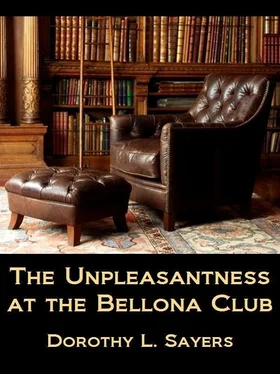“Then you too…”
Wimsey waited; but she did not finish the sentence.
“It’s a kind of drug, of course. That’s an awfully trite thing to say, but it’s quite true.”
“Yes, quite.”
“I read detective stories too. They were about the only thing I could read. All the others had the war in them — or love…or some damn thing I didn’t want to think about.”
She moved restlessly.
“You’ve been through it, haven’t you?” said Wimsey, gently.
“Me?… well… all this… it isn’t pleasant, you know… the police… and… and everything.”
“You’re not really worried about the police, are you?”
She had cause to be, if she only knew it, but he buried this knowledge at the bottom of his mind, defying it to show itself.
“Everything’s pretty hateful, isn’t it?”
“Something’s hurt you… all right… don’t talk about it if you don’t want to… a man?”
“It usually is a man, isn’t it?”
Her eyes were turned away from him and she answered with a kind of shamefaced defiance.
“Practically always,” said Wimsey. “Fortunately, one gets over it.”
“Depends on what it is.”
“One gets over everything,” repeated Wimsey, firmly. “Particularly if one tells somebody about it.”
“One can’t always tell things.”
“I can’t imagine anything really untellable.”
“Some things are so beastly.”
“Oh, yes — quite a lot of things. Birth is beastly — and death — and digestion, if it comes to that. Sometimes when I think of what’s happening inside me to a beautiful suprème de sole, with the caviare in boats, and the croûtons and the jolly little twists of potato and all the gadgets — I could cry. But there it is, don’t you know.”
Ann Dorland suddenly laughed.
“That’s better,” said Wimsey. “Look here, you’ve been brooding over this and you’re seeing it all out of proportion. Let’s be practical and frightfully ordinary. Is it a baby?”
“Oh, no!”
“Well — that’s rather a good thing, because babies, though no doubt excellent in their way, take a long time and come expensive. Is it blackmail?”
“Good heavens, no!”
“Good. Because blackmail is even longer and more expensive than babies. Is it Freudian, or sadistic, or any of those popular modern amusements?”
“I don’t believe you’d turn a hair if it was.”
“Why should I? — I can’t think of anything worse to suggest, except what Rose Macaulay refers to as ‘nameless orgies.’ Or diseases, of course. It’s not leprosy or anything?”
“What a mind you’ve got,” she said, beginning to laugh. “No, it isn’t leprosy.”
“Well, what did the blighter do?”
Ann Dorland smiled faintly: “It’s nothing, really.”
“If only Heaven prevents Marjorie Phelps from coming in,” thought Wimsey, “I’m going to get it now… It must have been something, to upset you like this,” he pursued aloud, “you’re not the kind of woman to be upset about nothing.”
“You don’t think I am?” She got up and faced him squarely. “He said… he said… I imagined things… he said… he said I had a mania about sex. I suppose you would call it Freudian, really,” she added hastily, flushing an ugly crimson.
“Is that all?” said Wimsey. “I know plenty of people who would take that as a compliment… But obviously you don’t. What exact form of mania did he suggest…?”
“Oh, the gibbering sort that hangs round church doors for curates,” she broke out, fiercely. “It’s a lie. He did — he did —pretend to — want me and all that. The beast!.. I can’t tell you the things he said… and I’d made such a fool of myself…”
She was back on the couch, crying, with large, ugly, streaming tears, and snorting into the cushions. Wimsey sat down beside her.
“Poor kid,” he said. This, then, was at the back of Marjorie’s mysterious hints, and those scratch-cat sneers of Naomi Rushworth’s. The girl had wanted love-affairs, that was certain; imagined them perhaps. There had been Ambrose Ledbury. Between the normal and the abnormal, the gulf is deep, but so narrow that misrepresentation is made easy.”
“Look here.” He put a comforting arm round Ann’s heaving shoulders. “This fellow — was it Penberthy, by the way?”
“How did you know?”
“Oh! — the portrait, and lots of things. The things you liked once, and then wanted to hide away and forget. He’s a rotter, anyway, for saying that kind of thing — even if it was true, which it isn’t. You got to know him at the Rushworth’s, I take it — when?”
“Nearly two years ago.”
“Were you keen on him then?”
“No. I — well, I was keen on somebody else. Only that was a mistake too. He — he was one of those people, you know.”
“They can’t help themselves,” said Wimsey, soothingly. “When did the change-over happen?”
“The other man went away. And later on, Dr. Penberthy — oh! I don’t know! He walked home with me once or twice and then he asked me to dine with him — in Soho.”
“Had you at that time told any one about this comic will of Lady Dormer’s?”
“Of course not. How could I? I never knew anything about it till after she died.”
Her surprise sounded genuine enough.
“What did you think? Did you think the money would come to you?”
“I knew that some of it would; Auntie told me she would see me provided for.”
“There were the grandsons, of course.”
“Yes; I thought she would leave most of it to them. It’s a pity she didn’t, poor dear. Then there wouldn’t have been all this dreadful bother.”
“People so often seem to lose their heads when they make wills. So you were a sort of dark horse at that time. H’m. Did this precious Penberthy ask you to marry him?”
“I thought he did. But he says he didn’t. We talked about founding his clinic; I was to help him.”
“And that was when you chucked painting for books about medicine and first-aid classes. Did your aunt know about the engagement?”
“He didn’t want her told. It was to be our secret, till he got a better position. He was afraid she might think he was after the money.”
“I daresay he was.”
“He made out he was fond of me,” she said, miserably.
“Of course, my dear child; your case is not unique. Didn’t you tell any of your friends?”
“No.” Wimsey reflected that the Ledbury episode had probably left a scar. Besides — did women tell things to other women? He had long doubted it.
“You were still engaged when Lady Dormer died, I take it?”
“As engaged as we ever were. Of course, he told me that there was something funny about the body. He said you and the Fentimans were trying to defraud me of the money. I shouldn’t have minded for myself — it was more money than I should have known what to do with. But it would have meant the clinic, you see.”
“Yes, you could start a pretty decent clinic with half a million. So that was why you shot me out of the house.”
He grinned — and then reflected a few moments.
“Look here,” he said, “I’m going to give you a bit of a shock, but it’ll have to come sooner or later. Has it ever occurred to you that it was Penberthy who murdered General Fentiman?”
“I — wondered,” she said, slowly. “I couldn’t think — who else — But you know they suspect me? ”
“Oh, well— cui bono and all that — they couldn’t overlook you. They have to suspect every possible person, you know.”
“I don’t blame them at all. But I didn’t, you know.”
“Of course not. It was Penberthy. I look at it like this. Penberthy wanted money; he was sick of being poor, and he knew you would be certain to get some of Lady Dormer’s money. He’d probably heard about the family quarrel with the General, and expected it would be the lot. So he started to make your acquaintance. But he was careful. He asked you to keep it quiet — just in case, you see. The money might be so tied up that you couldn’t give it him, or you might lose it if you married, or it might only be quite a small annuity, in which case he’d want to look for somebody richer.”
Читать дальше












